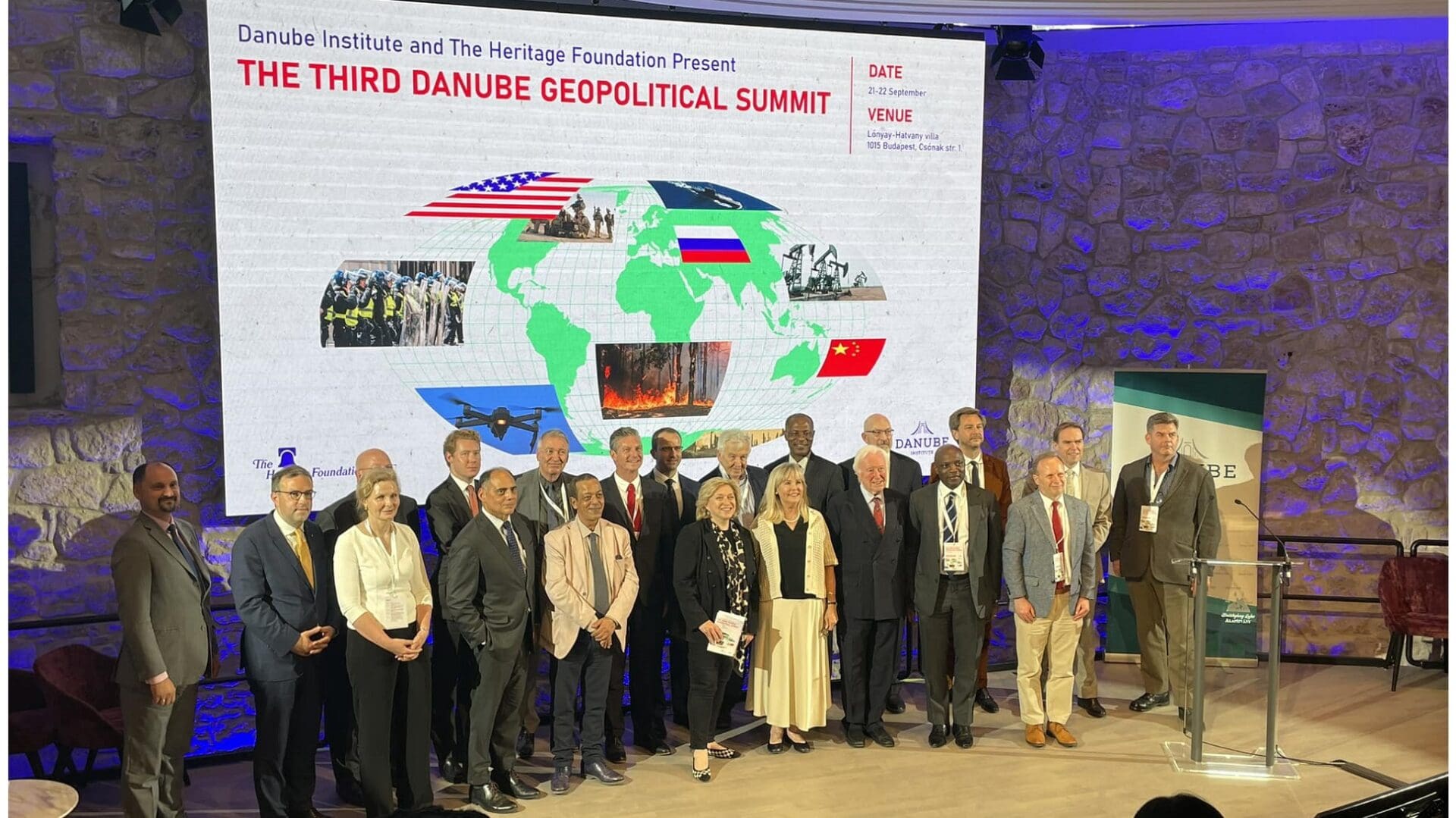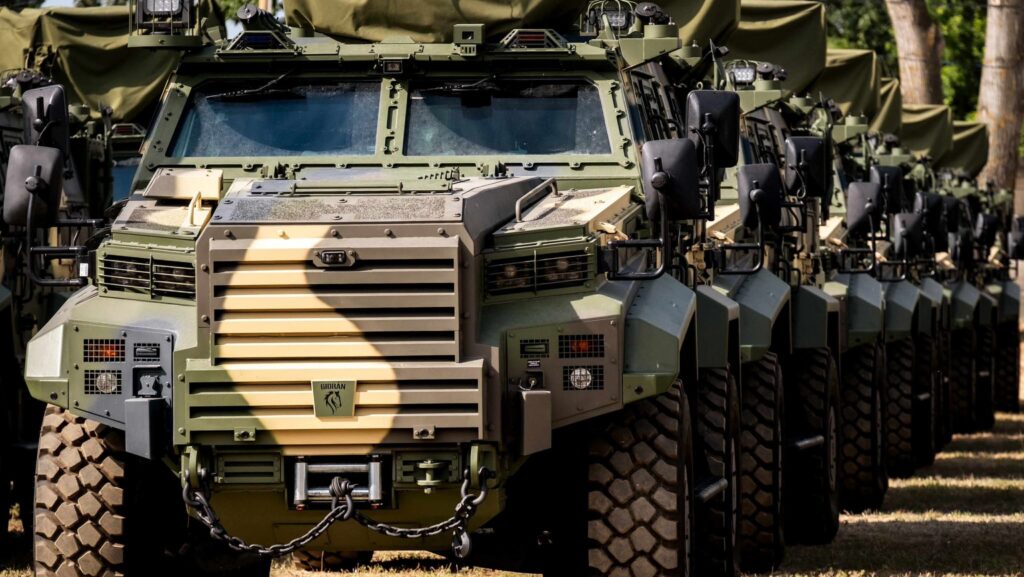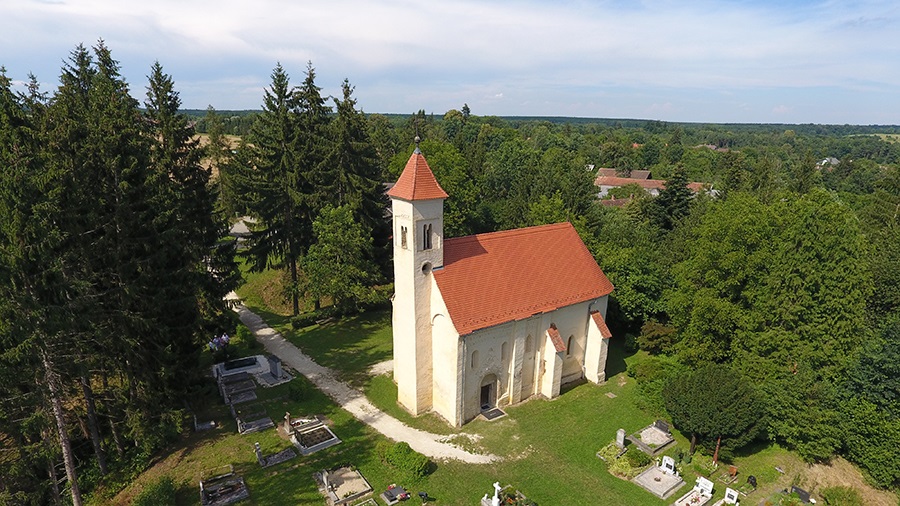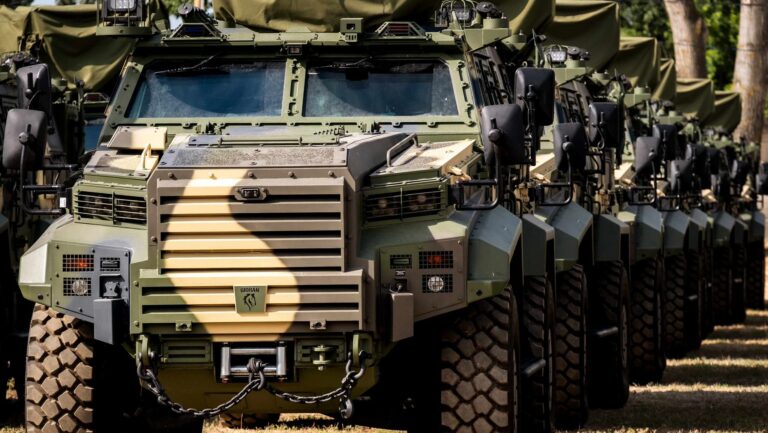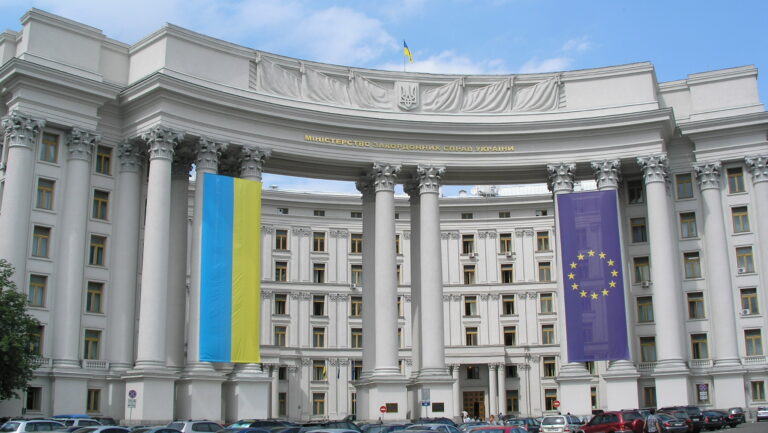The following report is partially based on the translation of a press release kindly provided to us by the Danube Institute.
A whole slew of internationally renowned experts, former and current state officials, academics, and researchers engaged in a thought-provoking discussion on 21–22 September 2023, at The Third Danube Geopolitical Summit, co-organized by the Danube Institute and the Heritage Foundation. John O’Sullivan, President of the Danube Institute, Dr James Carafano, Chief Advisor to the President of the Heritage Foundation, and Zsolt Németh, Head of the Committee on Foreign Affairs and Hungarians Abroad delivered the opening remarks of the event.
Dr Carafano lauded the successful cooperation between the two think tanks, the Danube Institute and the Heritage Foundation,
and stressed the importance of building transatlantic connectivity. As he highlighted: the Danube Institute is the place which gives a platform for real dialogue.
In his speech, MP Németh emphasized that the Danube Institute has greatly contributed to Hungary joining the international discourse of foreign policy. About the current global state of affairs, he stated: replacing the bipolar world order, a ‘concentric’ one is taking shape, the main actors of which are the G7, G20, and the BRICS states.
One of the main speakers of Day 1 of the event was Lewis Libby, researcher at the Hudson Institute and advisor to former US President George W. Bush, who delivered a speech on the greatest challenges of today. In his remarks, he lauded the organization of the new instalment of the Danube Institute event, which can be considered a tradition at this point.
The topic of the first panel discussion was about what a post-Ukraine war Europe and Asia will look like. Security expert Attila Demkó, head of the Center for Geopolitics at Mathias Corvinus Collegium, highlighted: strategically, Russia has already lost the war, as it failed to achieve its original goal—that is, to write history. Its current regime is playing for survival; however, due to its favourable economic metrics, Russia is posed for a long-term war. Meanwhile, there is little chance of Ukraine engaging in peace talks as, with Western support, they can fight a defensive war for years.
In case the war was to end with a Ukrainian victory, with Ukraine joining both the EU and NATO—which the expert finds very unlikely—, that would result in the weakening of not only Russia, but Ukraine as well, which, in turn, would bring on a weak Europe that would have to bear the consequences of the war. According to Mr Demkó, however, the most likely scenario is that all Ukrainian territories currently occupied by Russia will remain under the purview of the aggressor, which too would result in a weak Europe and a weak Ukraine; while Russia—allied with China—would be the West’s most prominent challenger. Regardless of the eventual outcome of the war, Ukraine has definitely endured major infrastructural damages already,
and it’ll have to face major demographic challenges as well.
Danube Institute on Twitter: “🎉Setting traditions: last Thursday&Friday we’ve hosted our Danube #Geopolitical Summit for the 3rd time!Lewis Libby, @HonTonyAbbott, Václav Klaus, Hideshi Tokuchi, @MohanCRaja, @BalazsOrban_HU, @milesyu10, Zsolt Németh – just a few of the big names from this year’s palette. pic.twitter.com/IMqJXioak4 / Twitter”
🎉Setting traditions: last Thursday&Friday we’ve hosted our Danube #Geopolitical Summit for the 3rd time!Lewis Libby, @HonTonyAbbott, Václav Klaus, Hideshi Tokuchi, @MohanCRaja, @BalazsOrban_HU, @milesyu10, Zsolt Németh – just a few of the big names from this year’s palette. pic.twitter.com/IMqJXioak4
Professor Hideshi Tokuchi, President of the Research Institute for Peace and Security, gave a lecture on the cooperation between Japan and NATO. (Editor’s note: Our interview with the professor is coming out tomorrow, 29 September.) As he stated, the proper management of the emerging security risks is in the best interest of both parties. Their common long-term goals are maritime security, supervision of weaponry and the curtailment of its spread, the advancement of consultation and dialogue, as well as the spreading of fundamental values. This is why mutual cooperation bears great significance for both NATO and Japan, he argued.
Michael Anton, senior researcher at the Claremont Institute, who also served in the National Security Council under Former Presidents George W. Bush and Donald J. Trump, outlined the strategy of the United States in these conflict-filled times.
In Mr Anton’s opinion, China has been posing a significant challenge for centuries. Over the course of history, the Asian country was forced to abandon its communist doctrines in its economic policy in order to prosper and improve the standard of living of its citizens. As for the relationship between the US and China, during the time of President Reagan, the Chinese economy started to gradually open up, which forced the former POTUS to make an important decision: he continued the policy of opening and integration, which was advantageous for both countries. Nowadays, however, the United States recognizes that China poses a great challenge, but the Biden Administration still focuses on the military situation, and not the economic questions, which pose even greater threats.
Former Australian Prime Minister Tony Abbott, the former leader of the Liberal Party, made Taiwan the focus of his speech.
The former PM believes we live in the time of ‘a new Cold War’,
which is a lot more dangerous than the previous one, as China’s a lot more advanced with better military technology, and has better economic metrics compared to the USSR as well. Consequently, the US is not ready to take steps against it, since that would be a great threat to the international community as a whole. As he pointed out, the current crisis led to a serious food shortage, and we had to deal with deficits in terms of trade, too. As for China, he claimed that President Xi Jinping is aiming to solidify the power of his Communist Party, and if necessary, he is ready to take Taiwan by force, for which the militaries of many countries—including Australia’s—are unprepared.
The second panel discussion of the day centred around geoeconomics. Václav Klaus, the second President of the Czech Republic, Neven Vidaković, the CEO of LOTI Trading LLC, and Catherine McBride, a member of the UK government’s Trade and Agriculture Commission, all agreed that the free market is a lot more advantageous for all than a planned economy; and were also in agreement that one of the main tasks of the countries is to build up their resilience against adversarial powers, such as China.
In his speech, President Klaus emphasized that we are currently living in times of not only economic, but also geopolitical uncertainties, which is constantly undermining economic development. The West, in the meantime, has engaged in gradual self-destruction due to the prominent ideologies there. Personal freedoms and the free market have been ‘put to shame’, while radical ideologies such as extreme green policies, gender theory, multiculturalism, and the overbearing NGOs have become the newly accepted orthodoxies.
The autonomy of the economy has all but disappeared,
all the welfare benefits have put too much of a burden on it, and over-taxation and overregulation are great obstacles to growth as well. A systemic reform is needed to prosper again, according to President Klaus.
Neven Vidaković approached the subject from a microeconomic point of view. In his opinion, problematically high inflation will not disappear soon, it will only decrease. He does not consider the current inflation a core inflation, rather, a structural inflation, which cannot be solved by strict monetary policies.
In the afternoon, Dr David Martin Jones, Director of Research at the Danube Institute, led a panel discussion about energy security. Timothy M. Egan, President and CEO of the Canadian Gas Association, Brigham McCown, Senior Fellow and Director for the Initiative on American Energy Security at the Hudson Institute, Damjan Krnjević Mišković from Azerbaijan, the Executive Director at the Center for International Relations and Sustainable Development, and CEO of Prime Atlantic Ltd Ayo Otuyalo from Nigeria took part in the conversation.
‘We wouldn’t be having this debate if there was no war,’ Mr Mišković said in his remarks. The expert stressed that, in the wake of the sanctions imposed on Russia, connectivity is more important than ever for the European Union, in terms of energy issues as well. He went on to state that Azerbaijan could play a major role in providing Europe its energy security, as it has a significant number of gas pipelines that do not cross into war-torn territories.
Mr Egan and Mr Otuyalo also stressed their respective countries’ strategic significance. Mr Egan believes that Canada’s natural features make the green transition very easy for his country, and hopes it will be able to achieve a completely carbon-neutral economy by 2050. However, he also referred to the fact that, in the past few decades, Canada was not going forward on the path to carbon neutrality at the expected rate, which is why it is fair to ask if it is even a realistic goal for the country. ‘We need a clear strategy,’ he emphasized. Mr Otuyalo also highlighted the great natural resources his country, Nigeria, has, drawing special attention to the importance of the large amounts of lithium found there.
Day 2 of the Summit
The Prime Minister’s political director Balázs Orbán kicked off Day 2 of the event. In his opening address, he stressed the importance of ‘open and honest dialogue’ in the discussion of the topic of the day, geopolitics, pointing out that even adversarial press coverage can help ‘spread our message across the world’.
He went on to state Hungarians are ‘outspoken and controversial people’, referring to a 19th-century British author and aristocrat living in Budapest, who once wrote of the Hungarians that ‘they speak openly and boldly of issues their neighbours dare not even whisper about’.
About the more contemporary issues, Mr Orbán told his audience that we are living in an age of ‘tectonic shifts’. As he pointed out, the West’s only advantage on the global stage is its military power, which bears less of an influence in the age of nuclear deterrence. In other aspects, such as economic and institutional, the global East has caught up with the West; and the unipolar moment of US hegemony seems to be ending. We are getting back to something similar to the Cold War era of the 1950s, Mr Orbán opined, in the sense that the US is grouping the nations of the world into ‘good and bad countries’ again. With these statements, he was referring to US President Joe Biden’s speech made in Warsaw, Poland in March 2022, in which he characterized the recently outbroken Russo-Ukrainian war as a battle between democracies and autocracies.
As for Hungary, Mr Orbán outlined that its goal is to avoid being ‘an instrument of greater powers’,
as well as to become one of ‘the most developed countries’, and ‘to assume a regional leader role’.
With these objectives in mind, Hungary would also want to become a ‘bridge between East and West’, not taking sides on cultural issues between the two, but also honouring its commitment to the NATO alliance.
Finally, the keynote speaker touched on the current state of US–Hungary relations. He claimed that Hungary would prefer to be partners with the United States, and not be constantly pressured by them on cultural and other issues. He also said the kind of foreign policy that the US is pursuing under the current administration can potentially result in ‘fewer allies’ for them. He ended by saying that whether the current war in Ukraine will continue or come to the end is a matter in the hands of the United States.
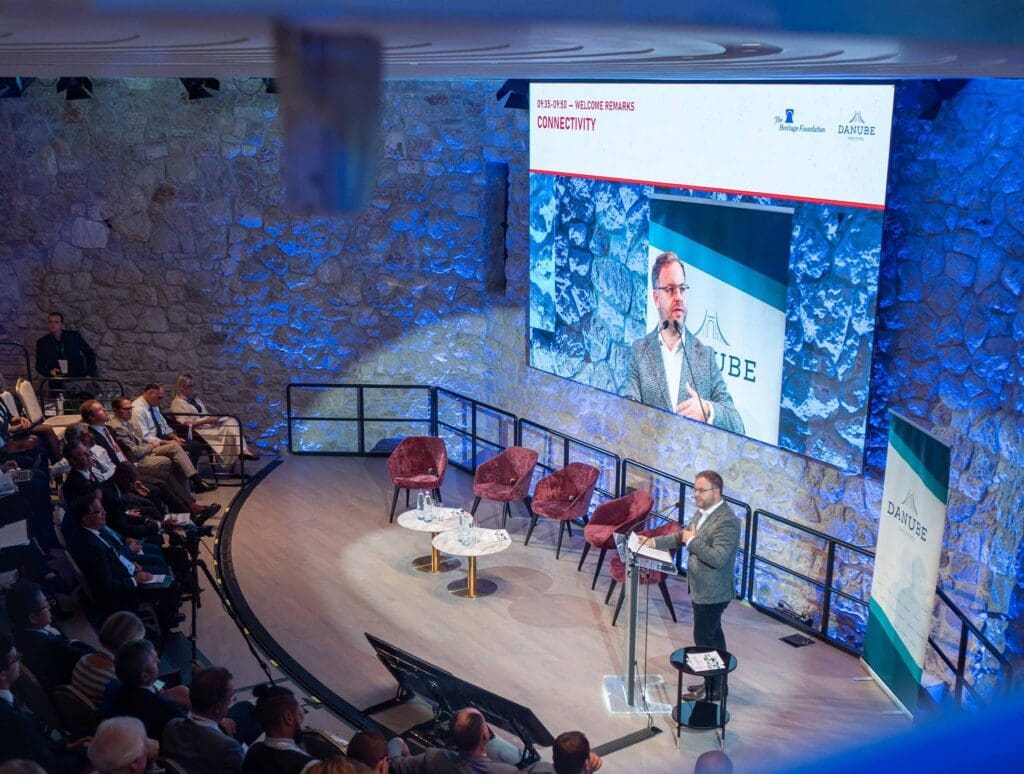
After Mr Orbán’s opening remarks, a panel of four took the stage, all of whom also delivered short speeches of their own, in the framework of a panel titled ‘G2 World and US-China Rivalry’.
These distinguished speakers were none other than Professor S. John Tsagronis, Professor of Statecraft and National Security Affairs at The Institute of World Politics in Washington, D.C., and former Senior Director on the National Security Council Staff from the US; Dr Miles Yu, Senior Fellow and Director, China Center at the Hudson Institute, also from the US; Professor Michael Rainsborough, Academic Principal at the Australian War College from Australia; and Dr David Morris, Senior Fellow at the Center for China and Globalization, also from Australia.
‘Two suns in the sky’—this recent remark by Prime Minister Viktor Orbán of Hungary, made at the Tusványos festival this summer, describing the current geopolitical relations between the United States and China, was referenced by multiple speakers in this segment. Professor Tsagronis obviously disagrees with the Hungarian PM, claiming that his remarks were ‘provocative, but wrong’, adding that this way of thinking is ‘reminiscent of the “balance of power” political thinking that we endured too much of in the Cold War’.
He explained that this worldview was best promoted by former US Secretary of State Henry Kissinger, who advocated for a ‘diplomacy without a moral compass’, with the aim of preserving that aforementioned ‘balance of power’. However, as Professor Tsagronis explained, the likes of US President Ronald Reagan and British Prime Minister Margareth Thatcher rejected this notion, which led to the fall of the Communist Soviet Union. He also pointed out that, just like in the case of the US and USSR, there is no moral equivalence between today’s United States and Communist China either.
Dr Yu also was in disagreement with PM Orbán’s claims about the ‘two suns’, saying that
the current Chinese regime’s number one priority is survival,
as it fears it lacks legitimacy with its own people. He went on to point out that, according to a recent Pew poll, China is unpopular in most other countries in the world, with Hungary being one of the exceptions. To further elucidate his point, Dr Yu proclaimed that ‘the future of the world is not in Beijing’.
Professor Rainsborough talked about the ‘grand strategy’ of the Western powers regarding the Russo-Ukrainian war, which he described as the tendency to intervene in underdeveloped regions, trying to get countries to fall in line with the liberal, democratic political order, which, ‘coincidentally or not, broadly aligns with US economic and security interests.’ According to Professor Rainsborough, this strategy has remained unchanged for the past three decades, ever since the Gulf War.
Meanwhile, Dr Morris spoke about how these days there is no consensus about a unipolar US hegemony in most of the countries of the world. This he experiences first-hand as his home country, Australia, is in close relations with South-East Asian countries highly influenced by China. He went on to point out that the notion that as countries modernize, they would also become more Westernized has been called into question, while continuously stressing to importance of ‘finding common ground’ in international diplomacy.
Next up, another set of four experts was slated to share their insights, this time about the topic of ‘hybrid warfare’.
Michelle Watson, Geopolitical Cyber Security Affairs, Cyber and Strategic Risk Deloitte Advisory Manager likened hybrid warfare to China’s unrestricted warfare, and defined it as attacks not only on military targets, but also on civil infrastructure, such as energy, nuclear, and information. She then went on to talk about the so-called ‘information warfare’ part of this new type of attack. She first emphasized the crucial role private sector companies such as Elon Musk’s Starlink, Mark Zuckerberg’s Facebook, or Lockheed Martin play in the defence against cyber and informational attacks.
Ms Watson used the term ‘corporate statecraft’ to describe the relationship between major private companies and the government. She concluded by explaining the so-called ‘information warfare kill chain’, the modus operandi by which adversarial countries disseminate misinformation among a rival nation’s populace, thus weakening them from within.
Professor David Bretz from the Department of War Studies at King’s College London outlined the frightening current state of affairs.
According to him, a civil war in the West is very likely.
He cited the model which describes the life cycle of empires and the diminishing ‘social capital’, as in, public trust in institutions, as evidence of the upcoming doom.
He opined that in that case, it would most likely be ‘dirty’ guerilla warfare as opposed to traditional military engagements, and the divisions would be among urban-rural or ethnic lines. Then, ominously, he also warned us all that a very small group of people could cause a lot of damage, as crucial public infrastructure in the West, such as large electrical pylons or gas and oil storage tanks are generally lightly or not at all guarded.
Dr James Carafano, Chief Advisor to the President of the Heritage Foundation, highlighted in his speech that incentivizing and accepting migration is an outdated solution to the demographic problems. Instead, supporting the traditional family model in the developed world would serve the case better. However, this latter is now under attack in Western societies. As he pointed out, if the world fails to curtail the endless wave of migration, malicious leaders around the world can choose to apply the ‘migration weapon’, as Fidel Castro of Cuba did in the early 1980s, or President Lukashenko did against Poland in 2021.
Related articles:

